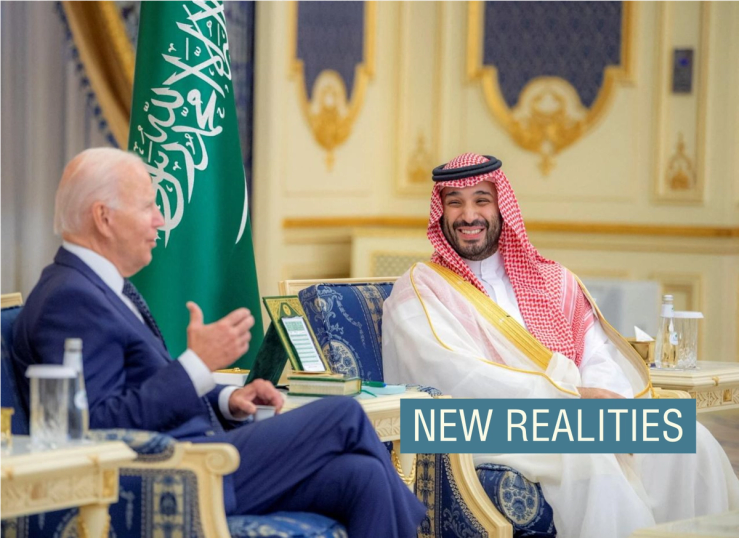
Faisal J. Abbas is an award-winning journalist and Editor-in-Chief of Arab News.
Oil and security: These are the two historical issues that defined Gulf-US relations for decades. While both topics continue to be important, Gulf priorities and capabilities are shifting, American needs are changing, and the incoming US administration, whoever it may be, needs to pay attention to the new realities on the ground.
Politically, the Gulf is becoming an even greater partner for stability in the region and beyond. Take for example the ongoing Saudi-US cooperation to mediate between warring parties in Sudan or the role the kingdom played in securing a prisoner swap between Russia and Ukraine, which included Americans.
Economically, things are changing. Gulf countries, such as Saudi Arabia, the UAE, and Qatar, seek to diversify their economy and reduce their dependence on energy exports. America is also changing; and while it continues to need the Gulf to ensure global energy market stability, and counter inflation on its own shores, it no longer needs the oil coming from here.
For context, let us remember that in 2008, US oil production was below 4 million barrels a day while imports from Saudi Arabia hovered above 1.5 million barrels. The US now produces 13 million barrels a day — 4 million more than Saudi — and imports less than 500,000 barrels from the kingdom. Saudi Arabia and the UAE’s biggest oil markets are now based in the East, with China and India leading the way.
Of course, maintaining energy market stability is a mutual interest. So, while Saudi Arabia, in its capacity as the dominant player in OPEC+, reiterates its commitment to this stability, the incoming US administration needs to also remember that it takes two to tango. To keep energy prices — and costs of goods in general — from jumping even higher, Washington needs to work with Gulf allies on regional stability, ensuring maritime safety in both the Red Sea and Straight of Hormuz, and stopping malign actors from targeting energy facilities.
There are also opportunities beyond oil and security. As we speak, there is a unique momentum happening in the Gulf, and there are plenty of new sectors — from mining to entertainment to peaceful nuclear programs — where first movers will have a tremendous advantage. Topping the list is technology, where cooperation between US tech and Gulf countries can create huge win-win situations.
For its part, the UAE has been signaling this shift for years. In 2017, it became the first country in the world to appoint a minister for artificial intelligence. Last year, the World Government Summit in Dubai was inaugurated with Beethoven’s 10th symphony — which the composer had been assembling when he died — completed by AI. Technology was high on the agenda of UAE President Sheikh Mohamed bin Zayed’s first state visit to Washington this week, where he and US President Joe Biden discussed how the two countries can strengthen cooperation on advanced technologies including AI.

Saudi Arabia also has major tech and AI ambitions and is committing huge capital — $100 billion to start — to achieve them. A recent estimate from the Saudi Data and AI Authority (SDAIA) projects that AI will contribute 12% of the kingdom’s GDP by 2030, with the sector expected to grow at an astonishing 29% a year. PWC expects that AI could contribute $320 billion to the Middle East by 2030, about 2% of the total global benefits.
None of this is surprising to close observers of the Gulf. But I worry that at the highest level of US politics, where domestic politics might be all too consuming, these new realities might have not been absorbed yet.
On the same day as the Trump-Harris debate in Philadelphia, Riyadh was hosting the Global AI Summit (GAIN). In the US, the presidential debate only saw a single mention of AI, and that was in the context of the competition with China. From afar, the discussion seemed unexciting, and generated more bickering than bright ideas and hope.
Meanwhile, in Riyadh, companies and governments were making major announcements and unveiling thoughtful usage charters to govern the sector, all with robots on stage. Saudi Arabia is trying to ensure it carves out a high-ranking position for itself when it comes to AI.
Of course, I will not disagree with cynics who point out that having deep pockets helps. But they must also remember that Saudi Arabia has unique advantages that make its ambitions rightly placed. Geographically, the kingdom’s size almost matches Western Europe. This, combined with low energy costs are ideal for building huge data centers needed for AI breakthroughs. As Riyadh continues with its green and renewable energy investments, this will drive energy prices even lower.
A former senior US official told me that if the US and the kingdom agree to partner on AI, it “will likely prove as consequential to each economy and society as the energy partnership which began in 1938.”
A reassuring sign that the US — or at least the Biden Administration — understands the significance of this opportunity came during this month’s GAIN summit: Washington is considering allowing Nvidia to export advanced chips to Saudi Arabia, as Semafor first reported. The decision may also reflect Washington’s realization that it could be losing the race to China. Growing middle powers, such as Gulf countries, are eager to upgrade their infrastructure and provide their citizens and residents with the latest and best technologies — wherever they may come from.
Saudi officials have repeatedly said that the US continues to be their first partner of choice, but have nevertheless noted they have other options. The latter is critical in the context of the US election and how the candidates think of Gulf relations in terms of interests, creating jobs, and ensuring a leadership position when it comes to future technologies.
America’s competitors are pressing ahead: Guess who else was in Saudi Arabia while the AI summit was being held? Chinese Premier Li Qiang, who was received by Saudi Crown Prince Mohammed bin Salman and a number of high-ranking Saudi officials who all are serious about doing business.
This is why, whether the winner in November is Kamala Harris or Donald Trump, the message from the Gulf to the White House will be: absorb the new realities and reap the low-hanging fruit, before someone else does.

